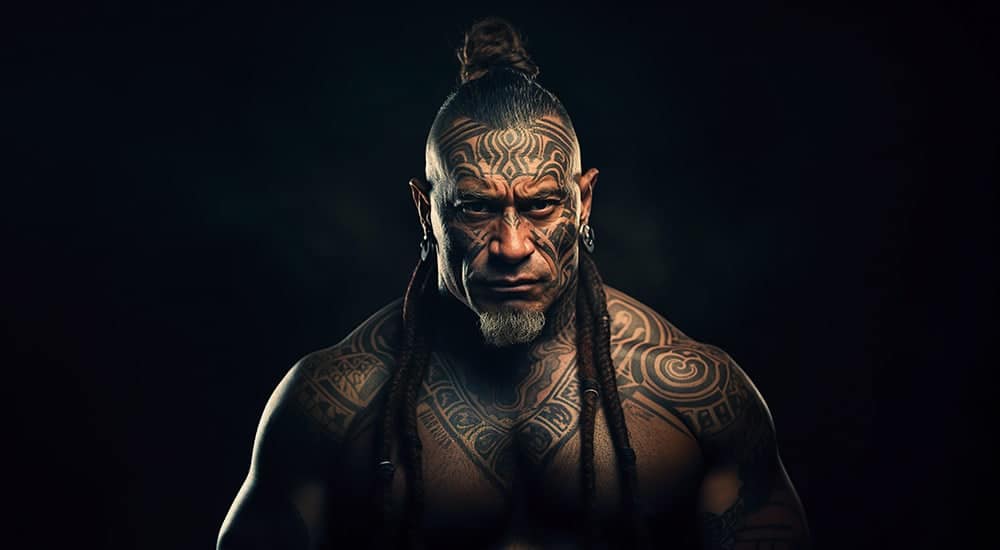Polynesian tattoos have captivated people with their intricate designs, deep symbolism, and rich cultural history. These tattoos, originating from the vast expanse of the Pacific Ocean and its many islands, hold a unique place in the world of body art. In this blog post, we’ll take a journey through the history of Polynesian tattoos and explore their significance in modern tattoo culture.
The Roots of Polynesian Tattoos
Polynesian tattoos, also known as “tatau” in many Polynesian languages, have a history dating back over 2,000 years. These tattoos are deeply embedded in the cultural traditions and belief systems of the Polynesian people, who are spread across the islands of the Pacific, including Hawaii, Samoa, Tahiti, and New Zealand.
The Polynesian tattooing process is labor-intensive and excruciatingly painful. Instead of modern machines, Polynesian tattoo artists traditionally used sharp, serrated bone or shell implements to puncture the skin, introducing ink into the dermal layer. This method was a rite of passage and held immense cultural significance, symbolizing the transition from adolescence to adulthood. Each tattoo was a mark of honor and a record of a person’s accomplishments and genealogy.
Symbolism and Designs
Polynesian tattoos are known for their distinct designs, which vary between island cultures. Some of the common design elements include:
Enata: These are human figures often incorporated into the tattoo to represent family and relationships. Enata figures can symbolize ancestors, siblings, or children.
Tiki: The Tiki is a prominent figure in Polynesian mythology, representing the first man. Tiki symbols are incorporated into tattoos as protective talismans.
Shark Teeth: Shark teeth patterns, known as niho mano, are a common design element in Polynesian tattoos. They symbolize power, protection, and adaptability.
Sun and Ocean Waves: The sun and ocean waves are often depicted in Polynesian tattoos, symbolizing life and rebirth.
Spearheads and Turtle Shells: These elements are integrated into the tattoo design to represent courage, strength, and longevity.
Each tattoo’s design was unique and carried specific meanings for the individual, such as their achievements, lineage, and personal journey.
Polynesian Tattoos in Modern Culture
In modern times, Polynesian tattoos have experienced a resurgence, transcending the cultural boundaries of their origins. The allure of these tattoos lies in their rich history, profound symbolism, and the captivating beauty of the intricate patterns. Here’s how Polynesian tattoos have made a significant impact on contemporary tattoo culture:
Tribal Revival:
Polynesian tattoos played a significant role in inspiring the broader tribal tattoo trend. The bold, black lines and geometric designs that are characteristic of Polynesian tattoos have influenced a wide range of contemporary tattoo styles, including tribal, blackwork, and minimalism.
Symbolism and Personal Connection:
Modern individuals who opt for Polynesian tattoos often do so to connect with the deep symbolism and cultural heritage that these tattoos represent. Many choose to incorporate elements of Polynesian designs into their tattoos to convey personal values, life experiences, or to honor their ancestors.
Cultural Respect:
Incorporating elements of Polynesian design into modern tattoos is often done with great care and respect for the cultural origins. Tattoo artists and enthusiasts alike understand the importance of preserving the authenticity and significance of these designs, even as they adapt them to modern preferences.
Tribute and Homage:
Polynesian tattoos are also often chosen by those who have a strong connection to the Pacific Islands, whether through ancestry, personal experiences, or a deep appreciation for the region’s cultures. These tattoos serve as a tribute and homage to the traditions and values of Polynesian societies.
The Future of Polynesian Tattoos
As contemporary tattoo culture continues to evolve, Polynesian tattoos are likely to remain a significant and influential style. The enduring appeal of these tattoos lies in their striking visual impact and deep cultural significance. Whether as standalone designs or integrated into larger pieces, Polynesian tattoos continue to inspire and captivate both tattoo artists and their clients.
In conclusion, Polynesian tattoos are more than just works of art; they are a testament to the rich history and cultural heritage of the Pacific Islands. Their enduring appeal and symbolism continue to shape and influence the world of modern tattoo culture. Whether you seek a tattoo that connects you to your roots, expresses your personal journey, or simply showcases their intricate beauty, Polynesian tattoos offer a unique and timeless choice in the realm of body art.

